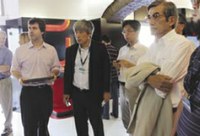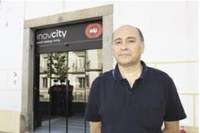Interest in project is crucial to boost exports
Symposium on microgrids ended with a visit to the InovCity store in Évora
Vera Nunes explained that "the aim was to provide a unique opportunity for the Symposium’s participants to visit a centre of excellence where some of the best practices in the world are promoted, and to understand the positive impact that this project has on energy consumers in Évora." In this specific case, the visitors heard the explanations of a business woman who changed her traditional energy habits, "managing to obtain a more efficient behaviour in terms of energy consumption."
Vera Nunes also stated that the participants were "pleased" with the way "we interact with our target audience, with how close we are to our customers, and also with how we position ourselves in the city." She continued: "This is, after all, our mission. We are here to work towards a common goal, which is satisfying the end user."
The communications specialist also stated that consumers, all those who joined and wanted to participate in this project, have provided very positive feedback, "and they have managed to reduce consumption levels up to 3.9 per cent." However, Vera Nunes stressed that it is also necessary to take into account the impact that this project will have in the future. "The project is still at a very early stage. All this will lead to a greater level of sophistication in tariffs and services provided. As such, we still have a long way to go," she stated.
 |
 |
Innovative electricity meters will be mandatory by 2020
João Peças Lopes, professor of the Faculty of Engineering of the University of Porto and researcher at the Institute for Systems and Computer Engineering of Porto (INESC Porto), was one of the mentors of this project and he claims that he was very pleased to see the project implemented and he believes it has the potential to be exported.
"The functional model and most of the specifications implemented here were developed at INESC TEC. As such, it is a great pleasure coming to Évora and seeing the project working," he admitted, adding that seeing all this physically and realising that everything works is very different from having things “on paper” and performing simulations.
The researcher highlighted that there is an EU directive that requires that by 2020, 80 percent of the electricity meters should be of this type. Therefore, he believes that this project will naturally be extended to many of the low-voltage consumers in Portugal. Moreover, this project has the potential to be exported to other countries "if we take advantage of the experience and knowledge we have obtained, we will all gain from this.

It is important to remember that more than a thousand people have already visited the InovCity store who took information on the project to the other countries in the world. In addition to the store, the participants of this international initiative had the opportunity to see an electric car being charged at a charging point in the street.
Diário do Sul, 5 September 2012




